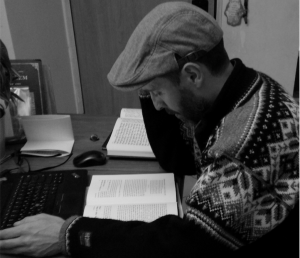“Two Nations Are in Your womb”: Dealing with More than One Internal Voice
My friend Mendel, who refuses to be boxed into the term haredi so I will refrain from doing so, is one of a kind – he lacks, from what I can see from outside, the internal struggles, the vicious strife between more than one force driving his actions. Of course he has his issues, and of course not everything is perfect in his world, and he deserves my respect and care because, like all of us, he is leading his own personal battles. It’s just that my friend Mendel leads his own personal daily battles with more of a sense of equilibrium, instead of falling on one side and then lapsing onto the other – which is, of course, the way I deal with things. The balance is something one gets from home, from one’s nuclear family – once the domestic system you absorb from your father and your good enough mother is imprinted onto your own system, the amount of work you will have to do in order to change even the minor aspects will be, so to speak, monumental.
When Rebecca feels the strife between the two fetuses in her womb, between the two forces present in her, she laments her being the receiver of such a clash with the following words:
Gen. 25:21-26 – “Isaac pleaded with the LORD on behalf of his wife, because she was barren; and the LORD responded to his plea, and his wife Rebekah conceived. But the children struggled in her womb, and she said, ‘If so, why do I exist?’ She went to inquire of the LORD, and the LORD answered her, ‘Two nations are in your womb, Two separate peoples shall issue from your body; One people shall be mightier than the other, And the older shall serve the younger.’ When her time to give birth was at hand, there were twins in her womb. The first one emerged red, like a hairy mantle all over; so they named him Esau. Then his brother emerged, holding on to the heel of Esau; so they named him Jacob. Isaac was sixty years old when they were born.”
The barrenness in which one is not torn apart by the struggle, leads to nothing – it gives no fruit, it has no continuation, it opens the path to nothing but the sense of a present, static stance. The Lord is thus prayed to by Isaac in order to disturb this barrenness – the ensuing reality is one of impregnated chaos, in which there are struggling individualities, discordant voices, clashing forces which need to be brought into a concordant agreement. One might even want to add that the intestine fight is confused, and Rebecca needs the Divine agent to tell her that it is a battle between two individuals and not more – this reality is unbearable to her, as it is unbearable to me at times, and the inquiry “If so, why do I exist?” often comes up. How can one live like this? How can a person survive and produce thoughts worthy of being conceived in this chaotic and eternal war? The answer is, simply enough, that one cannot – but where there is chaos within, the expostulation, the delivery of that strife through outward signs leads to the simplification of things, to the individualization of forces and to their hierarchical disposition. While within Rebecca’s womb the two fetuses are equally mighty and their strength is balanced, when they come out – Esau first and Jacob second – the struggle turns into a vertical order. And yet, even in this semblance of an orderliness, it is the younger who is empowered over the older, and it is the older who is forced to come out into the world for first with the younger brother’s hand firmly locked onto his heel.
In my entrails, in my spiritual and intellectual “womb,” the older is usually stronger than the younger, and mightily pulls his own way – one half of my life lived in a certain way, with familial affiliations which cannot and must not be undone, a language and a culture which are, to say the least, distant from my present reality. The younger brother in me is Yaakov, he is the one who, no matter what, holds onto the heel of his older brother, and will not let go. The Sfat Emet notes repeatedly throughout the corpus of his commentaries on the Torah, that the only perfection man can attain is the awareness of imperfection – one can, in other words, aim to contain this strife within the balanced hierarchy of the two brothers, in the clear consciousness that this equilibrium is not perfect and that it will, at one point or other, lapse either here or there.
*Yaakov Mascetti holds a Ph.D. and teaches at the Department of Comparative Literature, Bar Ilan University.

